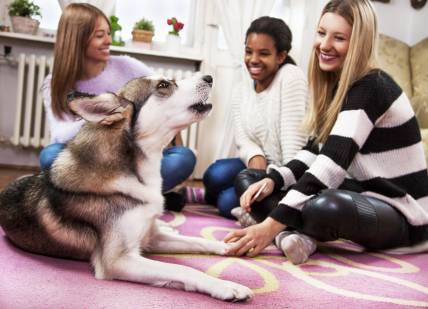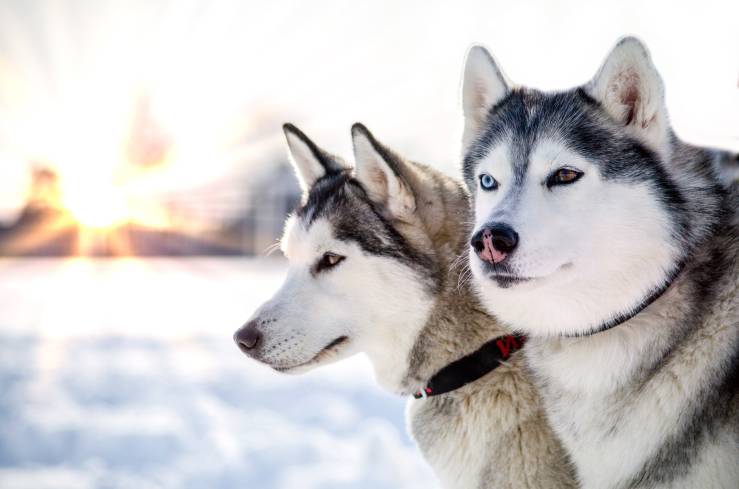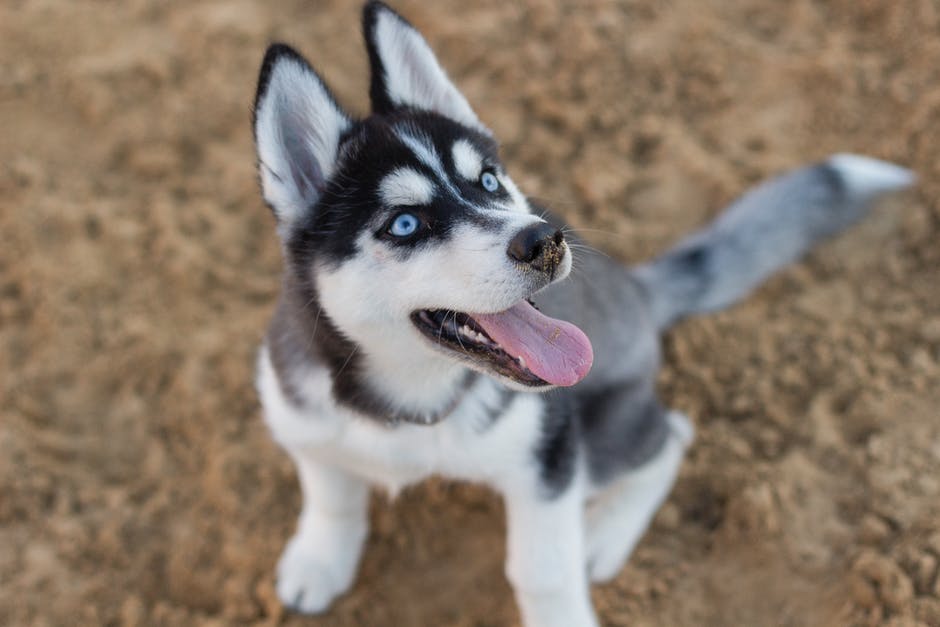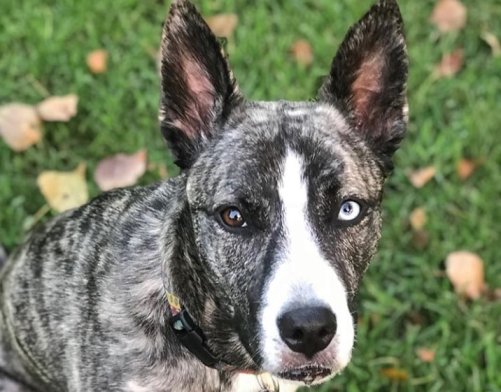Connect with a verified veterinarian in minutes. Licensed vets are available 24/7 to answer your questions. No need to worry about your furry family member.
Are you the pet parent to a husky puppy? If so, you may be wondering when your husky will stop growing! That’s a great question!
It’s a good idea to know what to expect as your puppy grows and eventually when he should stop growing. You’ll also want to know how big he’ll get!
To help you learn more about your husky’s growth, we’ve put together some information that includes a timeline chart for you to follow your fur baby’s growth. Let’s get started!
Some Facts About Huskies
Huskies are beautiful dogs that bear a strong resemblance to wolves. While originally bred to pull sleds in very cold climates, today, huskies have become a family favorite. However, they don’t do well in climates that are too warm.
These dogs were made for the cold; they have double-layer coats to keep them insulated in all types of weather. The husky’s undercoat is short and warm, while his overcoat is long and resists water. One cute note—a husky will wrap his tail around his nose to keep it warm!
What’s more, huskies are working dogs, which means they have a ton of energy! These dogs need at least an hour or more of exercise every day (as adults). Huskies that don’t have enough exercise may turn to chewing things in the house (furniture, shoes, and so much more!). They may also develop other unwanted behaviors. So, it’s crucial your dog has plenty of exercise each day. Oh yeah, and huskies rarely get tired (unless they’re puppies!).
Huskies also have striking blue eyes, which give them a very unique appearance.
A Little Husky History
Did you know that huskies originated in Siberia about 3,000 years ago? They were first raised by the Chukchi people, semi-nomadic people in Siberia. They raised the dogs to pull in the Siberian winter snows. The Chukchi people found huskies to be very strong, with high levels of endurance. And they were able to survive on minimal amounts of food in the freezing winter temperatures. How amazing is that?

Review symptoms, medications & behavior to keep your pets healthy with a Vet Online in just minutes.
Ask a Vet Live NowWhen Do Huskies Stop Growing?
Male and female huskies generally reach their adult height between the ages of 12 to 18 months. However, it takes the dogs longer to reach their adult weight, which doesn’t happen until they’re about 2-3 years old.
These figures can vary a little bit from puppy to puppy, but at least you’ll have a guide as to what to expect with your puppy’s size!
Husky Growth Timeline
Here are the charts that will help you see how large your fur baby will be at different ages.
Male Husky Growth Timeline (Average)
| Age | Weight (lbs) | Height (inches) |
| 2-4 months | 10-25 lbs | 10-12 inches |
| 4-6 months | 25-40 lbs | 12-15 inches |
| 6-8 months | 40-50 lbs | 15-19 inches |
| 8-10 months | 50-55 lbs | 19-22 inches |
| 10-12 months | 55-60 lbs | 22-24 inches |
| +1 year | +60 lbs | 24 inches |
Female Husky Growth Timeline (Average)
| Age | Weight (lbs) | Height (inches) |
| 2-4 months | 10-25 lbs | 10-12 inches |
| 4-6 months | 25-38 lbs | 12-14 inches |
| 6-8 months | 38-46 lbs | 14-16 inches |
| 8-10 months | 46-50 lbs | 16-18 inches |
| 10-12 months | 50-55 lbs | 18-20 inches |
| +1 year | +55 lbs | 20-22 inches |
The dogs grow the quickest in their first year. In addition, males tend to be heavier and taller than females. At this time, it’s essential to ensure your puppy is getting the right number of calories and all the nutrients he needs to grow up healthy and strong.
While husky puppies do need plenty of exercise, it’s important to avoid over-exercising them. This is because the puppies’ bones, joints, and ligaments are still developing. It’s best not to exercise a puppy hard until they’re over a year old or when the vet says it’s OK to do so.
This way, your puppy will have the time to grow strong without injuring himself due to over-exercising. What’s more, your fur baby will require a high protein and fat dog foot that ensure your puppy grows into a healthy adult dog.
When Do Huskies Mentally Mature?
That’s another great question! We can tell you that husky puppies do not become mentally mature at the same time they become physically mature. Generally, huskies tend to mature around the time they are two years old.
While that’s true, remember that huskies can be mischievous, extremely intelligent (your dog may outthink you!), and they sometimes throw temper tantrums. That’s all just part of being the pet parent to a growing husky!
Huskies are the most easily trained before they reach two years of age. This is the best time to ensure your dog learns the rules and how to behave correctly. By the time they reach two, huskies tend to mature and become more obedient dogs.
Husky Growth Stages
In this section, we’ll take a look at the husky growth stages and what you can expect at each stage!
Newborn to two weeks old: at this age, the puppies are so cute and fluffy! Male puppies usually weigh between 1-2lbs, while females weigh between 1-1.8lbs.
One month old: puppies are still very young at this age, and it’s a bit challenging to measure their height! However, as far as weight is concerned, male puppies tend to weigh between 2.5-5.5 lbs. Female husky puppies weigh between 2.5-5lbs.
One to two months old: it’s at this point that your puppy will start to really grow fast! At this point, male puppies usually weigh between 10-15lbs, and they measure between 8-10 inches tall. Female puppies weigh between 8-12lbs and measure between 8-10 inches tall.
Two to three months old: husky puppies are really growing now! Male husky puppies weigh between 10-25 lbs and measure about 10-12 inches tall. Female puppies weigh between 10-25 lbs and measure about 10-12 inches tall.
Three to six months old: your puppy’s features should become clearer now. At this point, male huskies will weigh between 23-30lbs and measure between 12-15 inches tall. Females will weigh between 18-30 lbs and stand about 12-14 inches tall.
Six to twelve months old: your husky puppy is now considered to be an adolescent (in other words, a teenager!). Male puppies will weigh between 33-43lbs and stand about 15-24 inches. Female husky puppies will weigh between 26-36lbs and stand about 19-22 inches tall.
Eighteen months: this is when your husky puppy (male and female) reach their maximum height. Male puppies tend to weigh between 45-60 lbs and stand between 21-24 inches tall. Female huskies will weigh between 35-50 lbs and stand about 20-22 inches tall.
Remember, these points are average. Some puppies may weigh more or less, while others may tend to be shorter or taller. It depends on the puppy’s parents and genetics. However, you can at least get an idea of where your puppy should fall in the average weights and heights as he grows!
What Factors Affect a Husky Puppy’s Growth?
There are many factors that can determine your puppy’s growth. If your puppy doesn’t seem to be meeting his milestones, it can be worrisome. However, remember that not all dogs will fit into the average. Some will be above or below the average height and weight.
The factors that have a large impact on a puppy’s growth include:
Diet & eating habits: if your puppy isn’t eating the right diet, he will probably tend to be smaller than other dogs his age. Huskies need a diet that’s high in protein and contains plenty of fat to grow strong and healthy.
Amount of exercise: huskies love to exercise, even as puppies! What’s more, huskies tend to have more muscle than other dogs, which only makes sense. These are sled dogs used to pulling sleds through heavy snow. If a puppy doesn’t get enough exercise, he won’t be able to reach his target weight or develop strong, healthy muscles.
Genetics: a puppy’s genes also play an important role in his growth.
Illness: if a puppy develops an intestinal parasite infection or another illness, this can also have a dramatic effect on his size and weight.
Vaccinations: puppies need all the required vaccinations in order to avoid getting sick. Some canine diseases can cause a puppy to grow poorly or even lead to death.
Emotional health: not many people believe dogs have emotional health; however, it’s true! Dogs need to be happy and have a purpose, especially working dogs like huskies. These are the elements that make them healthy in mind and body. Puppies that are stressed also tend to be smaller. However, if a puppy is happy and well-nourished, he’s very happy, which encourages his body to grow at the right rate.
How to Make Sure Your Husky Puppy Grows at the Right Rate
There are things you can do to help your puppy grow at the right rate; however, you can’t do much about your puppy’s genetics. These are the elements you can control to help your puppy grow:
- Feed him the right diet in the right amounts—check with the vet if you have any questions on what and how much to feed your husky puppy.
- Make sure your puppy has access to plenty of clean, freshwater.
- Help your puppy to have the right amount and type of exercise (avoid over-exercising)
- Ensure your puppy is happy.
How Can I Ensure My Husky Puppy Stays Healthy?
There are also steps you can take to ensure your husky puppy stays healthy! Most of this has to do with prevention, which is essential to your puppy’s health. Prevention starts with regular checkups with the vet as your puppy grows. Your vet may be able to spot a health issue that’s keeping your puppy from growing.
Prevention also means making sure your puppy receives the right vaccines at the right times. Your vet can guide you as to the right vaccination schedule for your fur baby. And don’t forget about deworming your puppy. Worms are a very common problem in dogs. If a puppy becomes infected with intestinal worms, he will not grow correctly or be healthy.
What’s more, if you’re ever concerned about your husky puppy’s growth and development, then be sure to call the vet. The vet can reassure you that your fur baby is completely normal. And if the vet believes there’s a problem, getting your dog to see the vet ASAP can make sure the problem is caught and treated early.
Early diagnosis and treatment can make a huge difference when it comes to a puppy’s health and growth.
At What Age Do Huskies Calm Down?
Each husky puppy is unique and has his own genetics, which determines his temperament and personality. Even so, it’s difficult to predict when your fur baby will calm down.
Huskies are high-energy, working dogs. They need plenty of exercise; otherwise, they may become hyperactive and develop unwanted behaviors.
Some huskies may begin calming down by the time they’re about twelve months old. They may still have a lot of energy, though! Many more huskies tend to have tons of energy and be hyperactive until they’re almost two years old.
Summing It Up
Husky puppies are amazing little beings that eventually grow into amazing, beautiful dogs. It can be difficult to anticipate how large your puppy will be. However, with the proper food, health care, exercise, and lots of love, you can expect your husky puppy to grow up to be a strong, stunning adult dog.
Remember that each puppy will grow at his own weight. Even so, if you’re ever worried that your puppy doesn’t seem to be the right size for his age, then be sure to call the vet. Your vet can check your puppy and make sure he’s healthy. Some young dogs will be smaller than normal, while other husky puppies will be larger than normal! It just depends on the puppy’s genes, diet, and more!
The key takeaway is to make sure your puppy has everything he needs to grow strong and healthy. If you do that, you’ll have a beautiful adult dog in no time!
Connect with a verified veterinarian in minutes. Licensed vets are available 24/7 to answer your questions. No need to worry about your furry family member.

Tom
Tom has always loved to write since he was little - he wanted to be either a writer or a veterinary doctor, but he ended up being a professional writer while most of his works are based on animals. He was born in San Francisco but later moved to Texas to continue his job as a writer. He graduated from the University of San Francisco where he studied biotechnology. He is happily married and a soon to be father!
Review symptoms, medications & behavior to keep your pets healthy with a Vet Online in just minutes.
Ask a Vet Live Now




